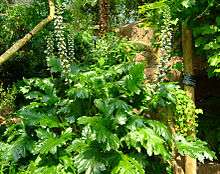Definify.com
Webster 1913 Edition
Acanthus
1.
(Bot.)
A genus of herbaceous prickly plants, found in the south of Europe, Asia Minor, and India; bear’s-breech.
2.
(Arch.)
An ornament resembling the foliage or leaves of the acanthus (
Acanthus spinosus
); – used in the capitals of the Corinthian and Composite orders. Webster 1828 Edition
Acanthus
ACANTH'US
,Noun.
1.
The plant bear's breech or brank ursine; a genus of several species, receiving their name from their prickles.2.
In architecture, an ornament resembling the foliage or leaves of the acanthus, used in capitals of the Corinthian and Composite orders.Definition 2026
Acanthus
Acanthus
Translingual

Acanthus mollis 'Oak Leaf' - Missouri Botanical Garden
Proper noun
Acanthus m
- A taxonomic genus within the family Acanthaceae – prickly herbs that grow in the Mediterranean; the acanthuses.
Hypernyms
- (genus): Plantae - kingdom; angiosperms, eudicots, core eudicots, asterids, euasterids I - clades; Lamiales - order; Acanthaceae - family; Acanthoideae - subfamily; Acantheae - tribe
Hyponyms
- (genus): Acanthus balcanicus, Acanthus dioscoridis, Acanthus ebracteatus, Acanthus eminens, Acanthus hirsutus, Acanthus ilicifolius, Acanthus mollis, Acanthus montanus, Acanthus polystachyus, Acanthus spinosus, Acanthus syriacus - selected species
References
- ↑ Philip Babcock Gove (editor), Webster's Third International Dictionary of the English Language, Unabridged (G. & C. Merriam Co., 1976 [1909], ISBN 0-87779-101-5)
- ↑ Lesley Brown (editor), The Shorter Oxford English Dictionary, 5th edition (Oxford University Press, 2003 [1933], ISBN 978-0-19-860575-7)
acanthus
acanthus
English
Noun
acanthus (plural acanthuses or acanthi)
- A member of the genus Acanthus of herbaceous prickly plants with toothed leaves, (family Acanthaceae, order Scrophulariales) found in the south of Europe, Asia Minor, and India.[First attested in the mid 16th century.][2]
- (architecture) An ornament resembling the foliage or leaves of Acanthus spinosus used in the capitals of the Corinthian and composite orders.[First attested in the mid 18th century.][2]
Synonyms
- (a member of Acanthus): bear's breech, bear's breeches, bear's-breech (rare)
Translations
plant
ornament
See also
References
- ↑ Philip Babcock Gove (editor), Webster's Third International Dictionary of the English Language, Unabridged (G. & C. Merriam Co., 1976 [1909], ISBN 0-87779-101-5)
- 1 2 3 Lesley Brown (editor), The Shorter Oxford English Dictionary, 5th edition (Oxford University Press, 2003 [1933], ISBN 978-0-19-860575-7)
- acanthus in Webster’s Revised Unabridged Dictionary, G. & C. Merriam, 1913
Latin
Etymology
From Ancient Greek ἄκανθος (ákanthos), from ἀκή (akḗ, “thorn”) + ἄνθος (ánthos, “flower”).
Pronunciation
- (Classical) IPA(key): /aˈkan.tʰus/, [aˈkan.tʰʊs]
Noun
acanthus m (genitive acanthī); second declension
- A plant known as bear's-foot (Helleborus foetidus).
- A thorny evergreen tree.
Inflection
Second declension.
| Case | Singular | Plural |
|---|---|---|
| nominative | acanthus | acanthī |
| genitive | acanthī | acanthōrum |
| dative | acanthō | acanthīs |
| accusative | acanthum | acanthōs |
| ablative | acanthō | acanthīs |
| vocative | acanthe | acanthī |
Descendants
References
- acanthus in Charlton T. Lewis (1891) An Elementary Latin Dictionary, New York: Harper & Brothers
- acanthus in The Perseus Project (1999) Perseus Encyclopedia
- acanthus in Harry Thurston Peck, editor (1898) Harper's Dictionary of Classical Antiquities, New York: Harper & Brothers
- acanthus in William Smith, editor (1848) A Dictionary of Greek Biography and Mythology, London: John Murray
- acanthus in William Smith., editor (1854, 1857) A Dictionary of Greek and Roman Geography, volume 1 & 2, London: Walton and Maberly